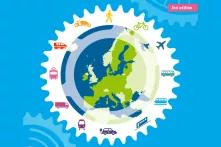After the German federal election in September 2021, the Greens joined a government coalition with the Social Democrats and the Liberals. Vice-Chancellor and Federal Minister for Economic Affairs and Climate Action Dr. Robert Habeck appointed Dr. Anna Christmann (MP from Stuttgart) as Federal Government Coordinator of German Aerospace Policy and Claudia Müller (MP from Stralsund) as Federal Government Coordinator for the Maritime Industry and for Tourism. Philipp Cerny and Martin Keim conducted a joint interview to find out more about their priorities and thoughts.

Philipp Cerny and Martin Keim: You have both been in your roles for about six months. What are your initial assessment from your new positions?
Anna Christmann: Space and aerospace are key for our transition to a climate-neutral country and continent. Shaping this path with close cooperation between government, science, industry and civil society has been my concern from day one. Thus, I used my first months in my new job to get to know the players and to start implementing the first key projects, as well as taking into account the important role of EU policies in these key technologies.
Claudia Müller: I am in charge of the maritime industry and tourism, two very different sectors that are facing very big challenges at the moment. Both are already familiar to me, both from my practical or political experience. In both fields, mobility is the key factor. Travelling, for instance, does not function without mobility. Therefore, the essence of my work is striving for a climate-neutral and sustainable mobility. In this perspective, the topics concerning Anna Christmann and myself are closely linked. In tourism, there are two main challenges - the transition pathway to climate neutrality and the recovery from the Covid-19 pandemic. Looking at the maritime industry, I cannot but stress its importance for our economy. International trade has always been reliant on seaways, and therefore on ships. For Germany, as an export nation, this is the basis for our wealth. Russia’s war of aggression against Ukraine has shown us, in a very brutal way, that we must diversify our energy resources. This will entail more reliance on sea-trade, and thus on ships. During the first months in my new position, I started to emphasise this strategic importance of the sector.
As Coordinators for the German Federal Government, you are covering sectors that have experienced a strong impact by the Covid-19 pandemic and by Russia’s war of aggression against Ukraine. How has this impacted your new role?
Claudia Müller: The maritime industry has been strongly affected by the pandemic and Russia’s invasion of Ukraine. Disruptions of supply chains are challenging in the shipbuilding industry, as well as for maritime transport. I have kept a very close eye on the situation of the seafarers. I maintain a close relationship with the sector and facilitate dialogue with the different ministries of the German federal government about the impact and potential solutions regarding the disruptions. For the tourism industry, the last two years were anni horribiles. Extensive support programmes have helped tourist businesses to survive; now we have to work on a full recovery. Russia’s war in Ukraine has only had a small direct impact on the German tourism sector. Tour operators with a focus on Russia and Ukraine have had to scale back their business. The German National Tourist Board (GNTB) has stopped its marketing campaigns for Germany in the Russian market. The industry, in general, is more affected by the indirect impacts, such as rising energy and food prices, inflation, and a tangible sense of insecurity within the population.
Anna Christmann: Both the aviation sector and the aerospace industry are strongly affected and influenced by these two major crises in quick succession. Managing and mitigating the impact of these challenges is a focus of my efforts. Enabling and fostering resilience for the aerospace sector are key, and therefore shape my new role the most.
Aviation, the maritime sector and tourism are key industries when it comes to reducing the climate impact of transport. How are you planning to tackle these challenges?
Claudia Müller: At the EU level there are several files within the Fit for 55 package that address the transformation of the maritime sector: the FuelEU Maritime Regulation and the Alternative Fuels Infrastructure Regulation (AFIR) proposals, a reform of the EU Emission Trading System (EU ETS), and a revision of the Energy Taxation Directive (ETD). It is important to have ambitious instruments that set the right incentives to move shipping away from fossil fuels. The EU is also working at the International Maritime Organisation level to set a new target to achieve zero emissions in the sector by 2050. I am sure that the German maritime industry can be a forerunner in climate-friendly technologies, due to its high innovation potential.
The Traffic Light coalition agreement states that Germany should be a sustainable, climate-friendly, socially just and innovative tourism location. One of the three core topics for the further development of the National Tourism Strategy is climate neutrality. We want to tackle the transformation of tourism together with the industry, and we see some very interesting approaches, ranging from promoting consumer awareness and transparency about the impact to more sustainability and circular economy in the destinations. Our aim is to make the entire travel chain climate-friendly and to harmonise ecological, as well as economic and social, aspects of the trip. The progress of the sector in climate protection and sustainability can be mapped quantitatively with the help of the Tourism Satellite Account.
Anna Christmann: In order to quickly decarbonise the aviation and aerospace sector, we have to address two major targets: firstly, we have to continue to strengthen our research and development efforts to develop new propulsion systems that are both more fuel efficient and disruptive (e.g. hydrogen-powered turbines); secondly, this must be accompanied by efforts at the national and European level to quickly increase the availability of sustainable aviation fuels (SAF). Within the Fit for 55 package, we are implementing incentives that will decrease the price and increase the market penetration of these new synthetic carbon-neutral aviation fuels. We want to be a driver for climate-neutral aviation in Europe, and eventually worldwide.
Green fuels are “advertised“ as solutions to make aviation and shipping more sustainable, particularly with the Fit for 55 package at the EU level (ReFuelEU Aviation and FuelEU Maritime initiatives). What is your take on that?
Claudia Müller: Green fuels are key to making shipping more sustainable. The main challenge is that these fuels are currently not available on a large scale. We therefore need to address both the supply and the demand side of green fuels. From our perspective, the reduction targets for CO2 emissions from ships in the FuelEU Maritime Regulation are not ambitious enough. A sub quota for synthetic fuels is needed to stimulate the market ramp-up.
Anna Christmann: Though the up-front investments for sustainable aviation fuel are high, they offer a very good option to make mid- to long-haul flights carbon neutral. Since commercial airplanes come with a high price tag, they have a long investment horizon. In order to reduce the carbon footprint of commercial airline fleets within the next decade, we have to rely on sustainable aviation fuels. Therefore, we need an ambitious regulatory regime at the EU level to trigger bold and substantial reductions of CO2 emissions by the aviation sector. There will be the “low-hanging fruit” of the transport sector to meet its climate goals as stated in the Paris Climate Agreement. Still, we also need more efficiency in the flight sector, since the request for SAF will be enormous in the following years, and it will be a huge challenge to provide enough truly carbon-neutral power-to-liquid based fuels. Better management of flight routes is part of these options for more efficiency.
While you are both German Federal Government Coordinators, the sectors in your responsibilities are hardly limited to German borders. Where do you see opportunities for European cooperation?
Claudia Müller: In the maritime sector, there are excellent opportunities for European cooperation regarding research and development, i.e. the European Research Area Networks (ERA-NET) and the European Partnerships in the European Research Framework Programmes. We have committed funding from national programmes for several initiatives of ERA-NET, such as MarTERA, which focusses on maritime and marine technologies, with 16 collaborating countries. The development of tourism in Europe is a matter for the EU Member States and regions, and in Germany for the federal States. For the tourism sector, which has been hit particularly hard by the Covid-19 pandemic, overcoming the crisis is also an opportunity for renewal. A key objective of Germany’s tourism policy in this context is the green transition, as described above. The Tourism Transition Pathway offers EU Member States guidelines and recommendations for action for the renewal process after the Covid-19 pandemic. Here, one of the goals is the green sustainable transformation of the sector. The ongoing implementation of the Tourism Transition Pathway and the development of the EU Tourism Agenda 2030-2050 based on it, in which Germany is actively participating, provide a good basis for an exchange of knowledge and experience between EU Member States, to accelerate the green and sustainable transition of the tourism ecosystem.
Anna Christmann: The aerospace industry has always relied on cross-border cooperation. When looking at the success story of Airbus, we see how European cooperation fosters growth and innovation. For me, the next step of European cooperation should go towards creating new technologies and propulsions for climate-neutral air traffic and aircrafts. We will also step up our efforts to establish a regulatory level playing field for climate-neutral flying beyond the EU's borders. The G7 is an important lever here, enabling Europe and North America to work together to minimise CO2 emissions in aviation.
What do you want to have achieved by the end of the term?
Anna Christmann: In aviation, we must now set the necessary course for ambitious climate protection. To this end, I want to have made real progress on the sustainable aviation fuel ramp-up by the end of this legislative term and, through our aviation research programme, to have helped the first of our largest hydrogen aircraft take off for test flights. In the space sector, I want Germany and Europe to continue to be technology leaders in Earth and climate observation, and to have established a competitive and resilient launcher ecosystem within Europe. I really want to use the next years to spread the word regarding how these innovative technologies can help us saving our wonderful planet.
Claudia Müller: Seeing the big challenges in relation to the very short time of a term, I am rather realistic concerning my goals. We have very ambitious targets: climate neutrality earlier than 2050, fixation of a fair and level playing field in Europe, and recovery from the Covid-19 pandemic. These targets cannot be achieved in a period of four years. All this needs action for the next decades. Nevertheless, today we have to take the first steps on this path and ensure that we will continue on it over the following years. In the long run, my goal is to achieve more sustainability in the maritime sector and in tourism, to facilitate cooperation between different actors in order to achieve more efficiency, and to strengthen the sectors to be more resilient in cases of other yet unknown crises.



